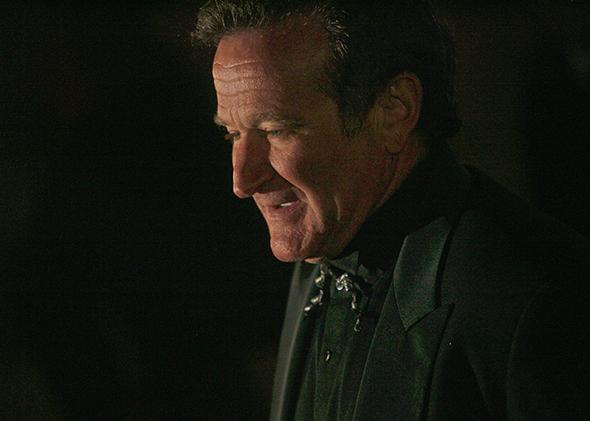A few years ago, Robin Williams was on Marc Maron’s WTF podcast, chatting about long-ago days in the San Francisco comedy scene. At one point he mentioned a comic named “Freaky” Ralph Eno who lit himself on fire. “To close?” Maron asked, thinking maybe this was the concluding flourish in Eno’s unusual stage act. “No,” Williams said, briefly taken aback by the question. “To end his life.” It’s maybe my favorite moment in the many great interviews Maron has conducted on WTF: incredibly dark, but also darkly funny. The two began to chuckle uncontrollably, and then riffed for a bit about how only a comic would’ve thought Williams was talking about the man’s act. “But seriously folks,” Williams quipped, “I’ll be here till … five minutes from now!”
Perhaps if I’d been paying closer attention, I would have noticed the darker parts of Williams’ comedy long before then. But for me, as for many people, he’d always been the irrepressible improviser and man of many voices who lit up concert halls with ad-libbed antics and wild, motor-mouthed routines. I loved him in serious movies, too, and sad ones, but I’d never made any connection between those films and the comedy.
To be fair, the connection wasn’t always obvious. In the 2010 WTF interview, which Maron reposted with a new introduction on Monday night, Williams acknowledged that for much of his career he didn’t plumb personal depths in the way that was integral to the stand-up of Richard Pryor or Chris Rock or Maron himself. But he described the way that comedy feels like “therapy” for him, “a relief from that shit,” meaning all the things that would get him down, “celebrity and all that other crazy shit.” Very down, as he also candidly explained, speaking at length with Maron about his depression and even his past suicidal thoughts. The conversation got into Williams’ alcoholism, which I also, back in 2010, knew nothing about. I’d heard a million references to Williams’ past cocaine habit, which people had long used as a misguided explanation for his incredible speed on stage. (Williams was ferociously quick when he was sober—it wasn’t drugs that made him faster than everyone else. And those blistering routines weren’t evidence of manic depression, aka bipolar disorder, either, according to Williams himself.) But I knew nothing about his depressed periods or how he tried to self-medicate away his sadness.
When Williams went on Louie a couple years later and the episode started with a funeral, it seemed entirely in keeping with the complicated person I was finally beginning to realize he was. I wouldn’t claim to fully understand him or know exactly what he was going through, of course, but at least he had, after decades of occupying my imagination in a dozen different ways, become a little more real, and more human. It makes the loss of him hurt that much more.
